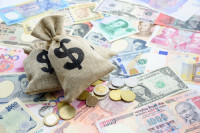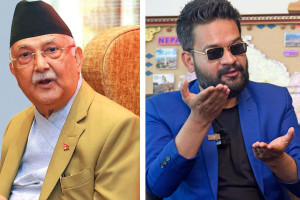Columns
The foe within
Our entire state is a shining example of commissions, kickbacks, and kleptocracy.
Amish Raj Mulmi
Another new year and the Nepali people are made aware of another instance of crony capitalism. The Batas group’s proximity to the Deubas, and the resultant deals that were allegedly swung in the organisation’s favour, made for remarkable front-page material. The news was met with resigned silence beyond social media; crony capitalism is nothing new, and if we ushered in reforms every time a scandal involving the private sector broke, Nepal would have to reimagine its very existence.
After all, the Batas group is just another in a long slew of business houses who’ve swung deals in their favour. The same accusations have been made against the Yeti Group, the Omni Group, the Vaidya Organisation and the HC Dugar Group. In his autobiography, Nepal’s only dollar billionaire admits that proximity to power centres as far back as during the Panchayat helped his organisation grow, affirming this is not a new phenomenon for the state.
If Mahendra Pul gossip was to go by, the Batas organisation’s proximity to the Deubas was long known in Pokhara (it is another matter that the media broke the news only when Sher Bahadur Deuba was in power). The tourist district of Lakeside has long believed a hotelier’s newfound success was derived from their close links with a now-departed minister. In a recent interview, my fellow columnist Sujeev Shakya highlighted how no Nepali business organisation has succeeded without growing close to political power centres and how the Nepali private sector has successfully lobbied against adopting international trade norms deprived Nepali consumers of the internationally accepted quality and standards.
But this is not a column about crony capitalism. Our entire state is a shining example of commissions, kickbacks, and kleptocracy. Our chief justice demands a portfolio for a relative. More than 2 million Covid-19 vaccine doses are unaccounted for because vaccines have been given out in private through bhan-sun. Political parties have occupied government land for years. The murder and disappearance of two women are not investigated, in one instance, for more than 10 years. The economy is in freefall; remittances have been declining; our trade and inflation indicators are not favourable; and the third wave of the pandemic is upon us, but a shortage of paracetamol has already been reported. All of this, just in the past few months.
Optimism in short supply
If the utterances of our leaders—including our former monarch—are to go by, Nepal’s single-most significant problem is ‘external forces’, or foreign influence. Sovereignty is imagined only within the boundaries of the territory. The Nepali media’s greatest money-spinner is any piece of news that castigates India, our leaders’ favourite punching bag. Our political class has derived unparalleled mileage from selling different brands of nationalism; peddling rashtriyata and saarvabhaumta has built careers, so why not continue to do so even when the country totters on the edge of an abyss?
Of course, Nepali leaders aren’t the first, or the last, to build decades-long careers on nationalism. American senator Joseph McCarthy’s communist witch-hunt at the peak of the Cold War led to the persecution of several thousand. Closer home, in India, the bogie of Pakistan and China has been evoked continuously. Under Narendra Modi, the enemy outside became the enemy within, and those who deviate from the ruling party’s agenda are now simply labelled ‘anti-national’.
Nationalist leaders love to cultivate xenophobia and insecurity among the masses to make themselves appear as saviours. But the saviour complex is simply a façade to what’s bubbling underneath. In Nepal, for example, invoking rashtriyata is an easy way out to erase the democratisation of favouritism and kickbacks in the new federal republic. But the discontent is increasingly visible. We see it in the decision of a group of citizens advocating for reforms despite partisan opposition to their demands; we see it in the opinion pages of most of our newspapers, and we see it when someone like a Prachanda asks a crowd if they consider politicians to be crooked, and receives a ‘yes’ as an answer.
The newly convened party structures don’t give much reason for optimism either; the status quo has been retained, and those who came forth as challengers have been sidelined or co-opted. Optimism is in short supply, as there are no commissions to be made out of it. A war of ideas that is being played out, and in all likelihood, will be fully expressed during the elections this year. Political parties will seek to capitalise on such discontent by portraying themselves as the solution to the country’s woes. But first, they will conduct elections in a way that is most beneficial to them.
On the surface, everything seems to be hunky-dory. The state continues to stumble along from one crisis to another, a drunk feeling his way home. Both our leadership and our intellectual class have thrived on a supposed existential crisis, constantly pointing fingers and labelling those who dissent as dollarbadis or videshi dalals.
Now, in this year of elections, the pitch of nationalism will grow sharper than ever before. Leaders will try to upstage each other in portraying themselves as the finest patriot. Each will promise a samriddha Nepal under their tenure. Party cadres will spread themselves thin to take forth their leaders’ message. Alcohol and khasi ko maasu will flow. Deals will be made in hotel rooms and bars. Finally, when the voting day arrives, the public will be convinced they are exercising their true democratic right, but little will they know of the backroom deals that will retain the state as it is.




 10.12°C Kathmandu
10.12°C Kathmandu















